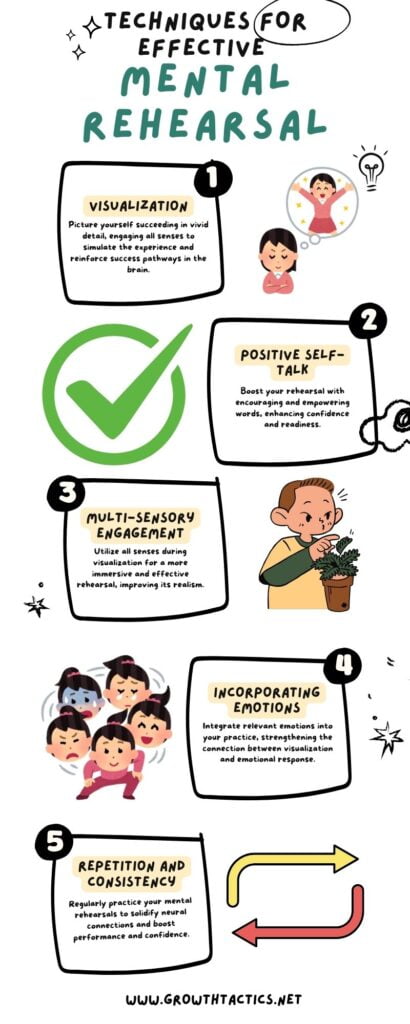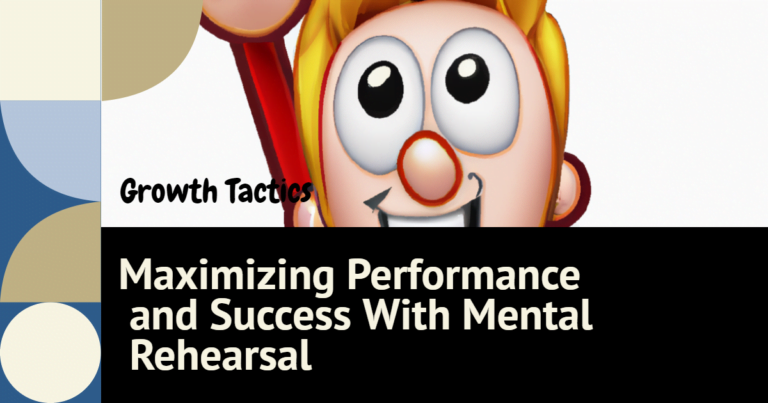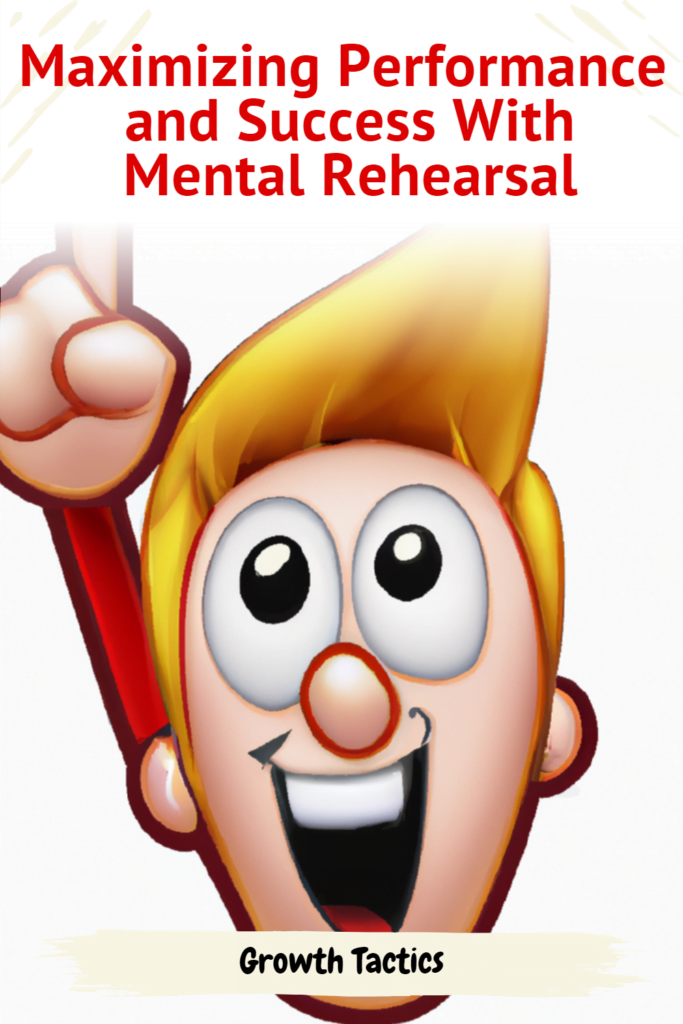Are you looking for a surefire way to skyrocket your success? Mental rehearsal might be exactly what you’re looking for. This incredible technique has been my secret weapon in overcoming obstacles, sidestepping roadblocks, and achieving remarkable outcomes.
If you crave more success in your life, then mental rehearsal is a game-changer you can’t overlook. Ready to unlock your untapped potential? It’s time to explore the world of mental rehearsal and witness the incredible impact it can have on your path to success.
Jump To Section
Understanding Mental Rehearsal
Mental rehearsal, also known as visualization or mental imagery, is a powerful technique used across various fields, from sports to business. It involves vividly imagining the successful completion of a task or goal, activating brain areas that aid in actual performance. The benefits include
- Overcoming fears and doubts
- Gaining a deeper understanding of tasks
- Identifying and overcoming potential roadblocks
- Boosting confidence and motivation
To practice mental rehearsal effectively, create a detailed mental image of your desired outcome, incorporate senses, and make it a regular habit. Incorporating mental rehearsal into your routine can significantly improve your performance and help you achieve your goals more efficiently.
The Science Behind Mental Rehearsal
The neurological mechanisms underlying mental rehearsal and its effectiveness across various domains have been explored in several studies. Research indicates that engaging in mental rehearsal activates the same brain regions involved in actual physical performance. This activation triggers the brain to create neural pathways that help improve skills and enhance performance.
Furthermore, studies have shown that mental rehearsal can influence physiological processes in the body. For example, athletes using visualization techniques have demonstrated enhanced muscle memory and improved motor skills. Similarly, individuals dealing with stress or anxiety have reported reduced cortisol levels and increased feelings of relaxation after engaging in mental rehearsal exercises.
One of the key scientific principles behind mental rehearsal is the concept of neuroplasticity. You may be asking what neuroplasticity is. It’s the brain’s ability to reorganize itself by forming new neural connections. By consistently engaging in mental rehearsal, individuals can effectively rewire their brains to support the desired outcomes they envision.
Techniques for Effective Mental Rehearsal

1. Visualization
Visualization involves creating vivid mental images of successfully performing a specific task or achieving a desired outcome. This technique allows individuals to mentally simulate the entire process, including sensory details, emotions, and actions, thereby reinforcing positive neural pathways associated with the intended performance.
2. Positive Self-Talk
Employing positive self-talk during mental rehearsal involves using affirming and empowering language to reinforce confidence, motivation, and self-belief. By incorporating constructive self-talk, individuals can enhance their mental rehearsal by instilling a positive and proactive mindset, which can directly impact actual performance.
3. Multi-Sensory Engagement
Engaging multiple senses during mental rehearsal, such as visualizing, auditory imagery, tactile sensations, and even olfactory and gustatory experiences, can create a more immersive and impactful mental simulation. By incorporating various sensory inputs, individuals can enhance the realism and effectiveness of their mental rehearsal exercises.
4. Incorporating Emotions
Integrating emotional experiences into mental rehearsal can significantly enhance its effectiveness. By engaging with the associated emotions, individuals can strengthen the neural connections between their mental imagery and emotional responses, thereby better preparing themselves for the actual experience.
5. Repetition and Consistency
Repetitive and consistent engagement in mental rehearsal is key to reinforcing neural pathways and optimizing its effectiveness. Regular practice of mental rehearsal techniques can lead to sustained improvements in performance, confidence, and overall cognitive abilities.
Incorporating these techniques into mental rehearsal routines can maximize its impact, empowering individuals to improve their skills, manage stress and anxiety, and achieve their desired goals with heightened confidence and success.
Applications in the Real Workld
In addition to enhancing performance and reducing stress and anxiety, mental rehearsal has a variety of applications across different domains. Here are some of the notable ones:
1. Rehabilitation and Physical Therapy
Mental rehearsal can aid in the recovery process for individuals undergoing physical rehabilitation. By mentally rehearsing movements and exercises, patients can maintain muscle memory, visualize progress, and improve their overall rehabilitation outcomes.
2. Leadership and Management
Leaders and managers can use mental rehearsal to prepare for challenging situations, such as negotiations, conflict resolution, or public speaking engagements. Visualizing successful leadership strategies and effective decision-making can enhance their confidence and performance in these demanding roles.
3. Skill Development
In various professions, mental rehearsal can be employed to enhance skill development. From surgeons visualizing complex procedures to pilots mentally rehearsing flight maneuvers, individuals can improve their expertise and decision-making through consistent mental rehearsal.
4. Social Interactions
Mental rehearsal techniques can be utilized to improve social skills and interactions. Individuals can visualize positive and confident social engagements, practice active listening, and prepare for challenging conversations, resulting in enhanced communication and relationship-building abilities.
5. Goal Setting and Personal Development
Mental rehearsal can be instrumental in personal growth and goal attainment. By visualizing the successful achievement of personal and professional goals, individuals can increase their motivation, focus, and determination, leading to greater success in their endeavors.
6. Music Performance
Musicians can benefit from mental rehearsal by visualizing flawless performances, mastering difficult passages, and interpreting music with emotion and artistry. Mental rehearsal can aid in reducing performance anxiety and enhancing overall musical proficiency.
7. Sales and Negotiation
Sales professionals and negotiators can use mental rehearsal to prepare for important meetings, anticipate objections, and visualize successful interactions with clients and counterparts, ultimately improving their persuasive abilities and negotiation outcomes.
8. Creative Problem-Solving
Mental rehearsal can be employed to envision innovative solutions to complex problems. By mentally simulating various scenarios and potential outcomes, individuals can enhance their creative thinking and problem-solving skills.
9. Language Learning
Mental rehearsal can assist language learners in improving their proficiency. Visualizing conversations, practicing pronunciation, and immersing oneself in language scenarios can aid in the acquisition and retention of new languages.
10. Performing Under Pressure
Individuals in high-pressure professions, such as emergency responders, military personnel, and air traffic controllers, can benefit from mental rehearsal techniques to prepare for and manage stressful and demanding situations, enhancing their decision-making and performance under pressure.
Incorporating mental rehearsal into these diverse applications can lead to improved performance, increased resilience, and enhanced overall well-being. By harnessing the power of mental imagery, individuals can optimize their skills and achieve success across various domains.
Overcoming Challenges and Pitfalls
While mental rehearsal is a powerful technique with numerous benefits, there are challenges and potential pitfalls that individuals may encounter. Understanding these obstacles and learning how to overcome them is essential for maximizing the effectiveness of mental rehearsal. Here are some common challenges and strategies for addressing them:
1. Lack of Focus and Engagement
Challenge: Difficulty maintaining focus and engagement during mental rehearsal sessions can limit the effectiveness of the practice.
Strategy: Employ mindfulness techniques such as deep breathing, progressive muscle relaxation, or meditation to enhance focus and engagement during mental rehearsal.
2. Negative Self-Talk and Doubt
Challenge: Negative self-talk and self-doubt can diminish the efficacy of mental rehearsal, leading to reduced confidence and motivation.
Strategy: Practice positive affirmations and constructive self-talk to counteract negativity and instill confidence and belief in the mental rehearsal process.
3. Difficulty Visualizing
Challenge: Some individuals may struggle with vivid visualization, finding it difficult to create clear and detailed mental images.
Strategy: Utilize sensory cues and prompts to enhance visualization, such as incorporating sounds, textures, and emotions into the mental imagery, and practicing regularly to improve visualization skills.
4. Unrealistic Expectations
Challenge: Unrealistic expectations about the immediate impact of mental rehearsal can lead to frustration and disappointment.
Strategy: Emphasize the cumulative and long-term benefits of mental rehearsal, encouraging patience and consistency in practice to see gradual improvements over time.
5. Lack of Consistency
Challenge: Inconsistent practice of mental rehearsal may limit its effectiveness and long-term impact.
Strategy: Establish a regular schedule for mental rehearsal sessions and integrate them into daily routines to ensure consistent and sustained practice.
6. Emotional Disturbances
Challenge: Strong emotions such as anxiety, stress, or fear can disrupt mental rehearsal and hinder the ability to focus and visualize effectively.
Strategy: Practice relaxation techniques, such as deep breathing, visualization of calming scenes, or progressive muscle relaxation, to manage emotional disturbances and create a conducive mental environment for rehearsal.
7. Difficulty Translating Mental Rehearsal to Action
Challenge: Difficulty translating the improvements made during mental rehearsal into actual performance or behavior.
Strategy: Incorporate action planning and goal-setting alongside mental rehearsal to bridge the gap between visualization and practical application, ensuring that insights gained from mental rehearsal are translated into tangible actions.
By recognizing these challenges and implementing appropriate strategies, individuals can enhance the effectiveness of their mental rehearsal practice and overcome potential pitfalls. With patience, perseverance, and a proactive approach, mental rehearsal can become a powerful tool for personal and professional growth.
Future Directions and Conclusion
As the understanding of mental rehearsal continues to evolve, there are exciting prospects for its future applications and advancements. Researchers and practitioners are exploring innovative ways to integrate mental rehearsal techniques into various domains, such as sports performance, healthcare, education, and personal development. In the coming years, we can anticipate a deeper exploration of virtual reality-based mental rehearsal, personalized visualization strategies, and the amalgamation of mental imagery with emerging technologies to enhance its effectiveness.
In conclusion, the potential benefits of mental rehearsal are vast and compelling. By harnessing the power of mental imagery, individuals have the opportunity to enhance their performance, reduce stress and anxiety, and cultivate resilience in the face of challenges. Whether you are an athlete aiming to improve your skills, a professional looking to enhance your leadership abilities, or an individual seeking personal growth, mental rehearsal offers a valuable tool for realizing your aspirations.
I encourage you to embark on a journey of self-discovery and growth by incorporating mental rehearsal techniques into your daily life. Through consistent practice and an open mind, you can tap into the transformative potential of mental rehearsal and unlock new levels of performance and well-being. Embrace the power of visualization, nurture your mental imagery, and experience the profound impact of mental rehearsal in shaping your future success and fulfillment.


